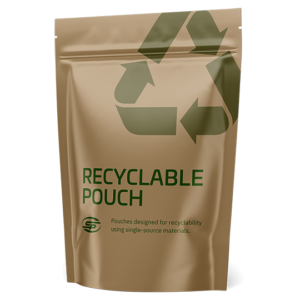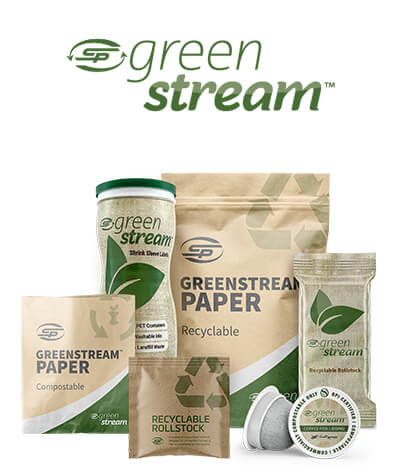Products
- Printed rollstock
- High-barrier flexible packaging
- Matte/gloss flexible packaging
- Compostable flexible packaging
- Recyclable flexible packaging
- Stick pack film laminations
- Lidding films
- Peel and reseal rollstock
- Shrink bands
- HFFS and VFFS rollstock
- Inno-Lok® pre-zippered rollstock
- Laser die-cut window rollstock
- Paper flexible packaging
- High burst strength flexible packaging
- Child-resistant flexible packaging
- Premade pouches
- Roll-fed labels
- Shrink sleeves
- Stretch sleeves
- Cold-seal packaging
- Thermoformed food trays
- Functional bags & pouches
Recyclable pouches
Sustainable packaging has become an important topic. Flexible packaging exerts less of an overall impact on the environment than most other types of packaging (see “source reduction” statistics below), but a downside of flexible packaging is that much of it isn’t easily recyclable.

For brands seeking recyclable packaging, we offer recyclable pouches made from mono-material, 100% polyethylene (PE). Clean, dry, 100% PE pouches can be recycled at store drop-off locations found at many supermarkets and grocery stores.
PE pouches provide a win/win/win solution: The environment, consumers, and brands all benefit. These pouches:
- Provide recyclability without compromising durability or resealability.
- Exude a distinctive look and feel that eco-conscious consumers recognize.
- Reinforce the image of environmentally responsible brands.
Although PE pouches aren’t ideal for every type of product, examples of items that tend to work well in high-density PE (HDPE) pouches are:
- Snacks
- Sweeteners
- Flours
- Nuts
- Baking mixes
- Pet food
- Rice
- Pasta
- Detergent packs
PE pouches can be further customized with closures, moisture barriers, and oxygen barriers to meet performance requirements.
Pouches made with post-consumer recycled (PCR) materials
For brands interested in packaging created from recycled materials, we offer various options:
Polyester (PET) pouches made from up to 90% post-consumer recycled (PCR) resin
These look and feel the same as PET pouches made without PCR materials. There are no trade-offs in terms of barrier, and no discernible differences between PET pouches made with PCR resin vs. non-PRC resin.
Polyester (PET) pouches made from up to 100% PCR resin
We are currently testing these materials to determine if there are any differences between these and other PCR options.
Polyethylene (PE) with up to 45% PCR resin
PE with PCR resin does look and feel a little different than non-PCR resin; there are some visual differences, as is typical with many materials made from post-consumer recycled content.
But there are no trade-offs in terms of barrier.
Pouches made from renewable resources
We can provide pouches made from bioplastics such as polylactic acid (PLA). PLA is derived from fermented plant starch (corn, cassava, sugarcane, or sugar beet pulp).
Industrially compostable pouches
PLA films are the primary option for compostable material in flexible packaging. PLA pouches are only compostable in industrial composting facilities; they will not biodegrade in backyard composting bins.
Source reduction
The Environmental Protection Agency (EPA) considers source reduction the most environmentally preferred strategy. Source reduction is any practice that reduces, eliminates, or prevents pollution at its source.
According to the EPA, lightweighting of packaging is an example of source reduction, and source reduction can:
- Save natural resources
- Conserve energy
- Reduce pollution
- Reduce the toxicity of our waste
- Save money for consumers and businesses alike
We are experts in downgauging or “right-sizing” flexible packaging structures. We’ve also helped many leading brands convert from rigid packaging to flexible packaging, effectively reducing the source material required for each package.
Less waste in the first place
Compared to rigid plastic containers, pouches:
- Use approximately 60% less plastic
- Require approximately 50% less energy to produce
- Generate less CO2 emissions during production
- Result in less landfill waste through source reduction; flexible packaging represents only about 2% of municipal solid waste
- Require fewer trucks for transportation — reducing fossil fuel consumption and CO2 emissions
Let's talk flexible packaging.
Ask us your packaging questions, and we’ll see how we can help you overcome your next packaging challenge.

Sustainable Packaging
Learn more about our sustainable packaging options including: recyclable, PCR, compostable, and biopolymer usage
GreenStream Products